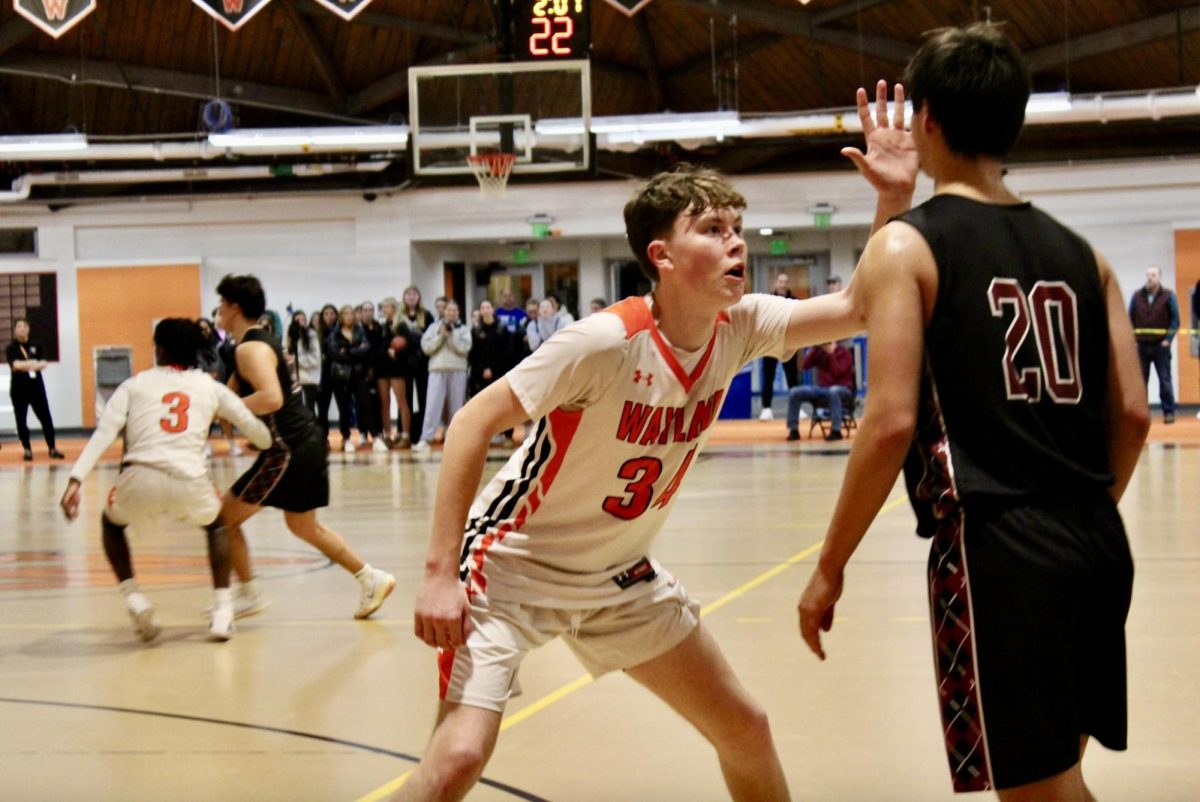
If you are a teenager at Wayland High School, chances are you have been sleep deprived at some point in your high school career. We all know the routine: you hear that dreaded beeping of the alarm, hit the snooze button three or four times, throw on the nearest article of clothing, and head to school in a daze.
The effects of fatigue don’t stop when students arrive at school, so it’s not out of the ordinary to see that kids have mastered the technique of using hoods and hats to cover their closed eyes while they nap. Those who do manage to stay awake and listen to the teacher while drowsy probably don’t comprehend much of the information being taught.
“What good does it do to try to educate teenagers so early in the morning?” said one of the nation’s leading sleep experts, Cornell University psychologist James B. Maas, PhD, to the “Monitor on Psychology.” “You can be giving the most stimulating, interesting lectures to sleep-deprived kids early in the morning or right after lunch, when they’re at their sleepiest, and the overwhelming drive to sleep replaces any chance of alertness, cognition, memory or understanding.”
So how much sleep is enough? According to researchers, adolescents between the ages of 11 and 22 need an astonishing 9 ½ hours of sleep. That is two more hours than the 7 ½ that the average teen gets each night. Since WHS starts the morning at 7:30 a.m., most students would need to be asleep by 9:30 p.m. Many parents and teachers say that the solution is simple: go to bed earlier. But for students who take part in after school activities in addition to homework, that just isn’t going to happen.
A teenager can sometimes get a good night’s sleep but still feel sleepy and dazed it in the morning. The hormone melatonin in the brain is responsible for this feeling, controlling the body’s internal sleep cycles. Researchers from E.P. Bradley Hospital in Rhode Island conducted an experiment that measured the presence of melatonin in teenagers’ saliva at different times of the day. They learned that the melatonin levels of teenagers rise later at night than they do in children and adults, and remain at a higher level later in the morning. This leaves us yearning for our pillows, even when it’s 9 a.m.
[adrotate group = “2”]
“There are plenty of times when I’ve been up all night studying for a first block test, but once I actually go to take the test, I’m so exhausted that I don’t even care whether I do well or not,” said freshman Caroline Mellen.
Drowsy driving is another dangerous effect of sleep deprivation. Every year, more than 50,000 adolescents are involved in car accidents caused by lack of sleep. However, since sleep-deprivation cannot be measured posthumously, it’s impossible to determine whether it is a factor in accidents when the driver does not survive, so this number could actually be far greater.
Australian researchers conducted an experiment to compare impairment from sleep deprivation to impairment from different blood alcohol levels. They concluded that after 17 hours of sleeplessness, participants in the study were about as impaired as they were with an alcohol level of 0.05 percent, which some western states define as legally drunk.
A common proposal is to switch to an 8:30 school start time, but would that be realistic? “Personally I would love for school to start at 8:30,” said math teacher Hannah Marton. “But to play the devil’s advocate, wouldn’t kids just go to bed later at night? I don’t think the extra hour would actually make much of a difference in their sleep schedules.”





![Last Wednesday, the Wayland School Committee gathered to discuss a number of topics regarding the health curriculum and Innovation Career Pathway course. Another large topic of conversation was the ways to potentially mitigate distracting cell phone usage. "These [phones] are going to distract your learning and social relationships," Superintendent David Fleishman said. "That's concrete right there."](https://waylandstudentpress.com/wp-content/uploads/2025/06/Screenshot-2025-06-04-at-9.49.31 PM-1200x886.png)



























![Troy Hoyt finishes the Boston Marathon, running for the Hoyt Foundation. T. Hoyt is the son of Hoyt Foundation CEO Russ Hoyt.
“[Running a marathon] might seem like a big thing, when it’s presented to you at first, but if you break it up and just keep telling yourself, “Yes, you can,” you can start chipping away at it. And before you know it, you’ll be running the whole 26 miles, and you won’t even think twice about it.” T. Hoyt said.](https://waylandstudentpress.com/wp-content/uploads/2025/04/C36E8761-1CBB-452E-9DF2-543EF7B1095E_1_105_c.jpeg)

















































Dina • Jan 11, 2018 at 9:46 PM
Hi! I’m a student at Newton South High School and I’m writing a paper about sleep deprivation and why it’s bad. This came up in a google search, and some of the facts are pretty cool. would it be possible for you to send me the sources of the studies you cite? Thanks so much!
(PS, this is suuper good and interesting! the quotes are very well picked 🙂
Janani Gandhi • Jan 16, 2018 at 7:44 PM
This article is several years old and the reporter is no longer working with our publication, so we don’t have the studies she used. Best of luck with your paper.
Julie • Mar 8, 2010 at 4:52 PM
Great article!! I think all would be in favor of a later start time for school! Also love that you included some information on drowsy drivers….doesn't seem like many realize how dangerous that is!! Great research! Thanks!
Kathy • Mar 2, 2010 at 7:25 PM
I was part of the Wayland School Start TIme Task force in 2004. Clearly, teens would be healthier and do better academically if they could start their day a little later. Feel free to dig up the task force report. Unfortunately, it is a very complicated situation, with a time change affecting everything from the elementary/middle school start time, busing schedules, athletics, after school activities, METCO, parents work schedules, etc, etc. I think the start time should be changed, but it would be a huge undertaking.
Brianna • Feb 28, 2010 at 10:32 PM
technically splitting your hours of sleep won't really do anything for you because you need to sleep for 9 1/2 hours straight to be completely rested, but if it works for you good! Also, the suggestion of making school start at 10 am is a little far fetched , like gabriel said we would be getting to sleep at like 11, but if we started school at 8:30 we would get out at 3:15. Sports would end between 5-6 leaving a ghours of sleep.ood 4 or five hours until we technically should be going to bed to get our full 9 1/2
unknown • Feb 28, 2010 at 2:11 PM
I'm not sure if I completely agree with this article. I think that teens only need about six hours of sleep. I don't go to bed until 12 everynight but I don't feel tired at all. Same with my friends
non-addict • Mar 1, 2010 at 12:41 AM
That's probably because you drink way too much caffeine…
disagree. • Mar 1, 2010 at 1:23 PM
i don't go to sleep at 9:30… i don't even get home until 11 most days because of activities i do outside of school. i don't usually fall asleep until midnight and i don't drink caffeinated drinks… so i can't really vouch for that answer.
nobody • Mar 1, 2010 at 5:38 PM
Besides the fact that it's been statistically proven and agreed upon by a lot of people with a great deal of money and test subjects and smartness that teenagers need at least 9.5 hours of sleep, I WANT at least 9.5 hours of sleep. So you can't argue the amount of sleep we need.
Kelly • Feb 18, 2013 at 5:29 AM
This is incorrect. Different people need different amounts of sleep. Some people can survive well on just 4 hours of sleep each night whereas some need a minimum of 10! In fact I know some people who need a full 12 hours of sleep (most likely due to suffering from sleep apnea).
The idea that everyone needs the same amount of hours of sleeps causes a great deal of problems. That is not correct at all.
freakystyleyandproud • Feb 27, 2014 at 9:30 PM
i agre with this
alicia • Feb 27, 2010 at 2:33 AM
rather than sleep in one big chunk, i take a nap from 4pm-8pm, then go back to sleep at 2am-6am. eight hours and i'm perfectly rested because the chemicals in my brain aren't getting overactive and crazy. winner.
nobody • Feb 26, 2010 at 9:48 AM
So, here's something that will make you all happy: we should not be awake at 7:30 am, much less at school. Teenagers need about 9.5 hours of sleep, but because of all those hormones, don't feel sleepy until at least 11pm (and trying to go to sleep before then just screws up your already screwed up sleep pattern). So let's say you go to sleep at 11pm, get your full 9.5 hours of sleep. That means you're waking up at 8:30am. At 8:30am, I'm going to my second block class already. But let's imagine that they were going to plan school around the students' needs (like sleep) and gave you enough time to wake up at 8:30am, shower, get dressed, eat, and get to school; school wouldn't start until like 10:00am. I don't know about you, but I'd rather start school at 10:00am as opposed to 7:30am.
So we can thank all those sleep-deprivation related problems (like stress, lack of attention, fatigue, lack of alertness, lack of cognition, and poor memory) on standardized education and the fact that we don't get our sleep because of school.
Gabriel • Feb 27, 2010 at 10:18 PM
At Wayland High School, the school day starts at 7:30 and ends at 2:15, meaning we are at school for 6 hours and 45 minutes. For the sake of the argument, let's say school starts at 10 (Why anyone would ever take 1.5 hours from waking up to getting to school is beyond me). That means that school would end at 4:45. Now, sports usually go about 2-3 hours and plays go 3-4, so depending on your after school activity (If you do one) you would be getting home between 6:45 and 8:45. With dinner, an average of about 2.5-3 hours of homework a night, and procrastination (Lets face it, most kids can't focus every minute of every day) thats about 4 more hours. Kids would be going to be in between 10:45 and 12:45, well beyond the "target range" of 11.
Kelly • Feb 18, 2013 at 5:27 AM
That's a terribly flawed argument. The hours involved remain the same no matter what time school starts. The issue at hand is that the early start time goes against the natural metabolism of the students, meaning it is less effective at capitalising on the body's natural rhythm.